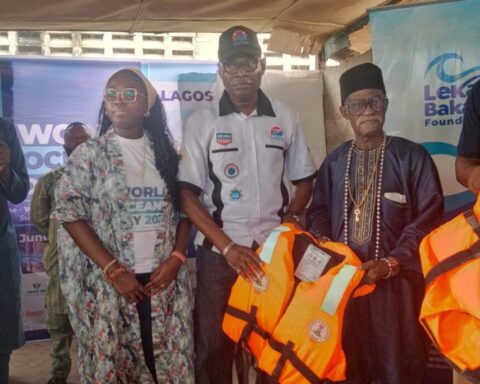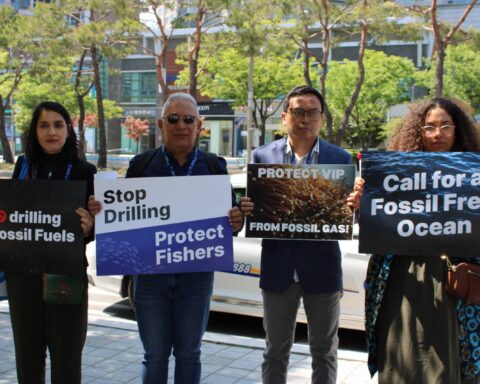As world leaders, international institutions, and civil society actors gather in Busan for the 10th Our Ocean Conference, South Korea finds itself at the centre of growing criticism not for what it says on the global stage, but for what it is doing in its own waters.
Amidst calls for stronger cooperation on climate change, marine biodiversity protection, and sustainable fisheries, the South Korean government is pressing ahead with offshore gas development in the East Sea, a decision that has drawn sharp rebuke from coastal communities and environmental defenders.
For Jinman Kim, a veteran red snow crab fisherman and president of the Guryongpo Coastal Red Crab Vessel Owners’ Association, the impacts of the government’s actions are already being felt in lost income, depleted catches, and mounting uncertainty.
“Our Survival Wasn’t Part of the Equation”
In late 2024, South Korea began exploratory drilling for the Blue Whale Gas Field in Yeongil Bay near Pohang—a site that overlaps directly with one of the country’s most important red snow crab fishing grounds.
“Between December 20 and January 7, auction volumes dropped by 20 tons compared to the same period last year,” Kim told Premium Times. “That’s over 67 million KRW (about $50,000) in immediate losses. Annual damages could reach billions. The Korea National Oil Corporation (KNOC) never adequately consulted us.”
For Kim and his colleagues, the losses are not just financial they are existential. “We are being pushed to the edge,” he said, shaking his head. “This is not just about gas or energy it is about our right to survive.”
Kim’s account reflects a deeper pattern of exclusion that small-scale fishers have long decried: decisions about their livelihoods being made without their voices in the room.
Adding to the disruption from drilling, Kim says the warming of ocean waters has forced crabs to migrate to deeper depths.
“We used to fish at around 700 meters. Now we have to go beyond 1,300 meters,” he explained. “It’s likely due to changes in bottom water temperatures, but no one is helping us adapt. We’re on our own.”
A 2024 study by South Korea’s National Institute of Fisheries Science confirms that ocean surface temperatures in the East Sea have risen by 1.9°C over the past 56 years almost double the global average.
The report also notes a steady northward shift in fishing grounds, leaving traditional fishers with fewer predictable areas to work in.
A Shared Struggle in Distant Waters
Thousands of miles away, along Colombia’s Caribbean coast, Julián Medina Salgado is facing similar threats. A small-scale fisherman from the Gulf of Morrosquillo and president of Colombia’s National Fishing Network, Medina Salgado says fossil fuel expansion is undermining the delicate ecosystems his community depends on.
“As fishermen, our lives and livelihoods depend on a healthy ocean,” he said. “Offshore oil and gas extraction jeopardises marine biodiversity, our food security, and our right to work and live in a safe environment.”
Like Kim, Medina Salgado is not just sounding the alarm he’s demanding accountability.
“Our governments must protect the oceans from these destructive industries,” he said. “Halting the expansion of offshore fossil fuels is not only a climate solution it is a step toward protecting our way of life and reconciling with nature.”
Medina is also a board member of the Latin American Union of Artisanal Fishing (ULAPA), a network amplifying the voices of small-scale fishers across the region.
His message resonates with growing global concern that industrial expansion particularly fossil fuel development poses an immediate threat to both marine health and the rights of ocean-reliant communities.
Leadership Under Scrutiny
The criticism isn’t just coming from civil society. From the South Pacific, Fijian officials are also urging stronger leadership and consistency from conference hosts.
“In Fiji, we live in this climate crisis every single day,” said Sivendra Michael, Permanent Secretary of Fiji’s Ministry of Environment and Climate Change.
“We face rising seas, stronger cyclones, and bleaching reefs. This is not just a climate issue it is about human rights.”
Michael challenged countries like South Korea to match their international rhetoric with concrete domestic action.
“Leadership is not just about speeches, but action. The Our Ocean Conference must set new standards, recognising the harm caused by offshore oil and gas,” he said.
He also urged global leaders not to let the momentum end in Busan. “In June at the UN Ocean Conference, and again in Brazil for COP30 and COP31 next year, this conversation must continue.”
A Crisis of Credibility
South Korea’s role as host of the Our Ocean Conference, alongside its growing leadership within the G20 and APEC, puts its own domestic energy policy under a bright international spotlight.
Critics argue that a country cannot champion marine conservation while simultaneously greenlighting offshore fossil fuel projects that undermine that goal.
Environmental groups have also flagged the lack of transparency around KNOC’s drilling operations and the absence of meaningful consultation with affected communities.
“South Korea risks sending the wrong message,” said a regional marine conservation advocate. “You cannot host an international ocean conference and ignore the very people who live and work on your coastlines.”
A Call for Ocean Justice
At the heart of the backlash is a broader demand for what many now call “ocean justice” a principle that affirms the rights of coastal communities to participate in decisions affecting their environments and livelihoods.
From Busan to Barranquilla, from Pohang to Port Vila, fishers are calling not just for conservation, but for justice: for the right to be heard, to be protected, and to thrive.
“We’re not against progress,” said Jinman Kim. “But it cannot come at the cost of our communities and the ocean we depend on. The ocean is not just a resource it’s our home.”
As the 10th Our Ocean Conference convenes, the question remains: will the global community listen? Or will the cries from the shorelines be drowned out by the hum of offshore rigs?
By Dare Akogun







